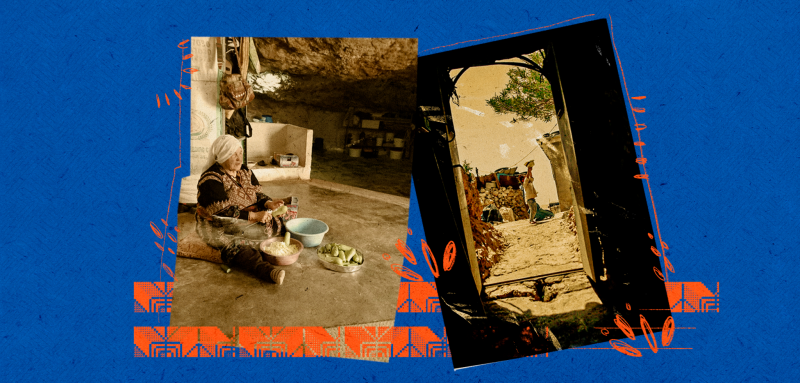In a 40-square-meter cave in Khirbet Maghayir Al 'Abeed in the Masafer Yatta area, south of Hebron (Al-Khalil) Governorate, 80-something-year-old Nuzha Jibril al-Najjar lives with her sons, their wives and children, and her fourteen daughters.
In this cave, Nuzha gave birth to all her children, after having set up her kitchen, sleeping area, and bathroom in its dark corners. She also added an oven made from mud and straw, in which she bakes loaves of traditional taboon bread every day.
Perhaps the only thing that could drive someone to live in such primitive conditions is the occupation.
The Masafer Yatta region, home to twelve villages inhabited by 2,800 Palestinians, faces daily house demolitions, forced evictions, and displacement, especially after the Israeli Supreme Court gave the Israeli army the green light to demolish these villages in May 2022.
“We live in caves because anything we build will be demolished by the Israelis here,” Nuzha tells Raseef22.
She adds that the occupation had previously demolished living rooms built by her sons. “Even the sheep pen was not spared from demolition,” she said.
“These caves are 3,000 years old. Their history extends from the Canaanite and Roman periods, through the Byzantine and Ottoman eras, up to the present day,” activist Osama Makhamreh from Wadi al-Jwaya in Masafer Yatta says.
It seems this ancient and primitive way of living has become the Palestinians' only refuge against Israel's displacement and ethnic cleansing policies. Yet, despite living in these caves, Israeli authorities continue to pursue them.
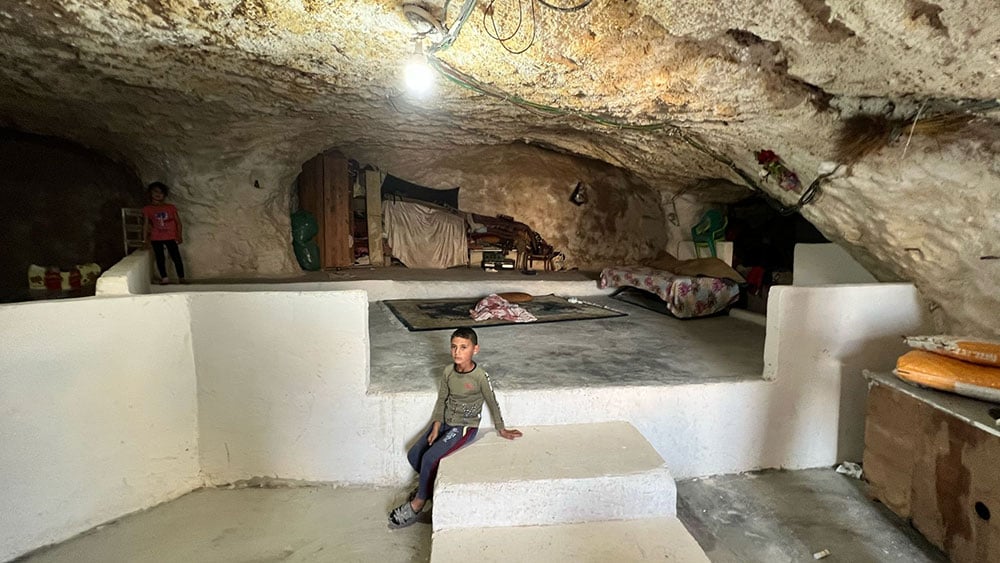 A child in one of Masafer Yatta's caves.
A child in one of Masafer Yatta's caves.
Forced displacement follows them even to the caves
“It is true that Palestine is rich in caves, but what makes the southern Hebron (Al-Khalil) area unique is that its caves are inhabited,” Nidal Younis, head of the Masafer Yatta Village Council, informs Raseef22.
He explains that there are around 120 caves used for housing, each accommodating large families consisting of a father, mother, and seven or eight children.
It seems these families have found a way to protect themselves from the near-daily demolitions carried out by the occupation forces.
Issa Abu Aram, aged 50 from Khirbet Janba, lives with his twelve-member family in one of the village's caves. "The occupation authorities demolished everything I built outside my cave. So, we are forced to live and sleep in the cave. If we don't, we will have to sleep out in the open. Despite the increasing frequency of attacks on us, we have no choice but to endure," Aram said.
"The occupation authorities demolished everything I built outside my cave. So, we are forced to live and sleep in the cave. If we don't, we will have to sleep out in the open. Despite the increasing frequency of attacks on us, we have no choice but to endure"
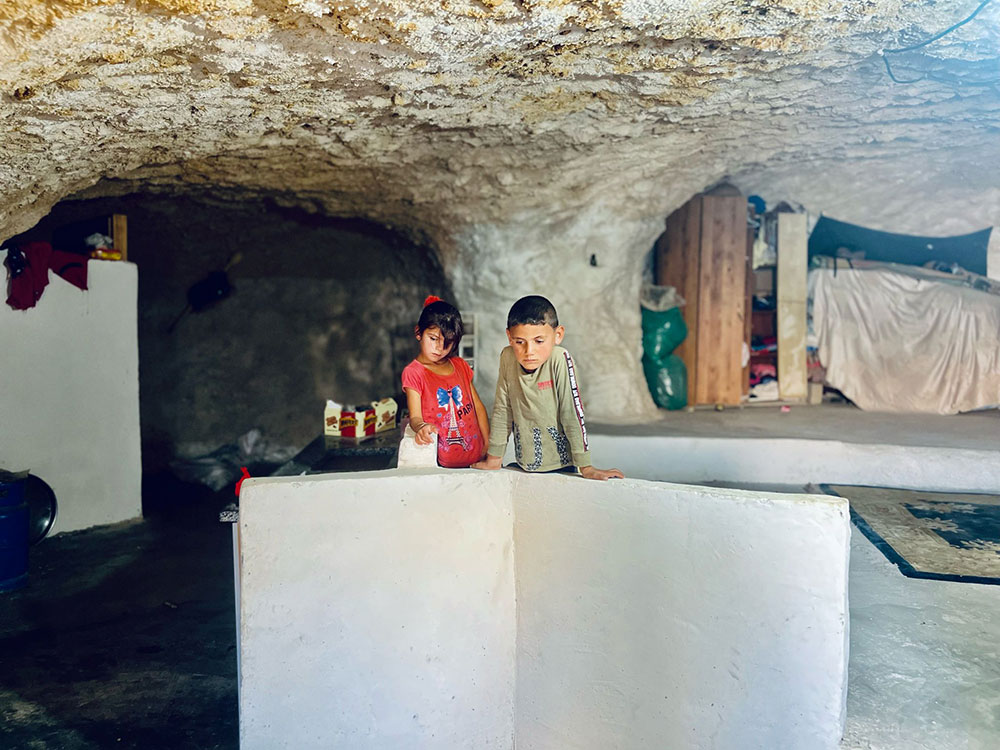 Children stand in one of the caves in Masafer Yatta.
Children stand in one of the caves in Masafer Yatta.
The attacks are not limited to demolition operations. The caves are also subject to raids, vandalism, and arrests.
Shehadah Salama Makhamreh, 60, lives in a cave with twenty family members, relying on farming and raising livestock. He says, "This year, soldiers have raided our cave more than four times. The last time was on the night of Eid al-Adha. We woke up to their voices after two in the morning. They searched, broke, and vandalized our home. They terrorized the women and made the children cry."
The occupation forces also arrested six members of Mahmoud Abu Aram's family from Khirbet al-Majaz while they were herding sheep. "They prevent us from approaching the apartheid wall near our village and from coming near any water wells," Mahmoud, 54, says.
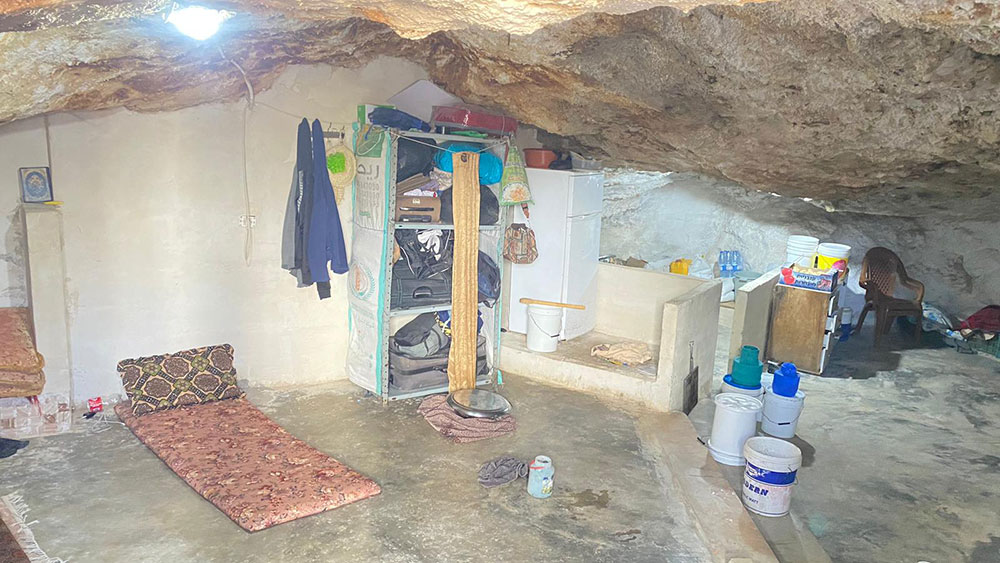 Issa's family cave in Masafer Yatta.
Issa's family cave in Masafer Yatta.
No escape from the settlers
Makhamreh describes how settlements surround the village on all sides. Settler sheep herders are always spread out on the mountain tops, which are less than 200 meters away from the Palestinian villages.
The settlers set up their tents and outposts even before getting official permission from the Israeli government.
"The settlers deliberately attack us, attack our shepherds, and steal or kill our livestock," Makhamreh says.
He adds, "They have killed more than 100 sheep over the course of two decades. Diseases have also started to decimate our livestock after we noticed that the settlers brought sick sheep into the area."
Makhamreh estimates that settlers targeting Palestinians and their livelihoods in Masafer Yatta costs them between $7,000 and $10,000 annually.
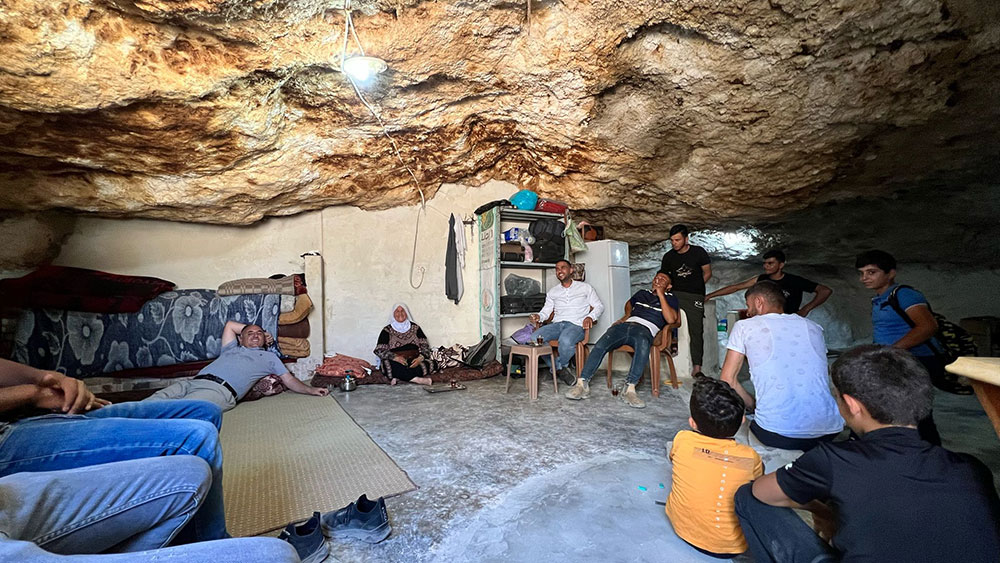 A family sleeps on the floor of a cave in Masafer Yatta.
A family sleeps on the floor of a cave in Masafer Yatta.
Mahmoud Abu Aram's situation is no different. He lives in a cave with ten family members. He says his grandfather had lived in this cave since the 1940s.
"The occupation forces and settlers raided the village before Ramadan. After the forces conducted searches and left, the settlers returned to steal everything in the village. They even took our clothes," says Abu Aram.
He continues, "They broke the mosque door, stormed inside, punctured the water barrels, and used the loudspeaker to mock the Prophet Muhammad. Then they attacked and beat us. I was left bedridden for two weeks."
"The occupation forces and settlers raided the village before Ramadan. After the forces conducted searches and left, the settlers returned to steal everything in the village. They even took our clothes.. They then punctured the water barrels and beat us. I was left bedridden for two weeks"
Forced displacement by law
The pressure and restrictions on citizens have increased, with prohibitions on construction and the demolition of their facilities, following an Israeli decision in 2022 to declare the area “Firing Zone 918,” according to activist Osama Makhamreh.
This declaration paved the way for the expulsion of around a thousand residents of Masafer Yatta, while settlers are still permitted to build outposts in the area without restraint.
"Although the culture of living in caves has existed in people's lives since ancient times, the policy of preventing new home construction, especially after the court's decision in May 2022, forced people to live in dire conditions in caves," confirms Nidal Younis, head of the Masafer Yatta Village Council.
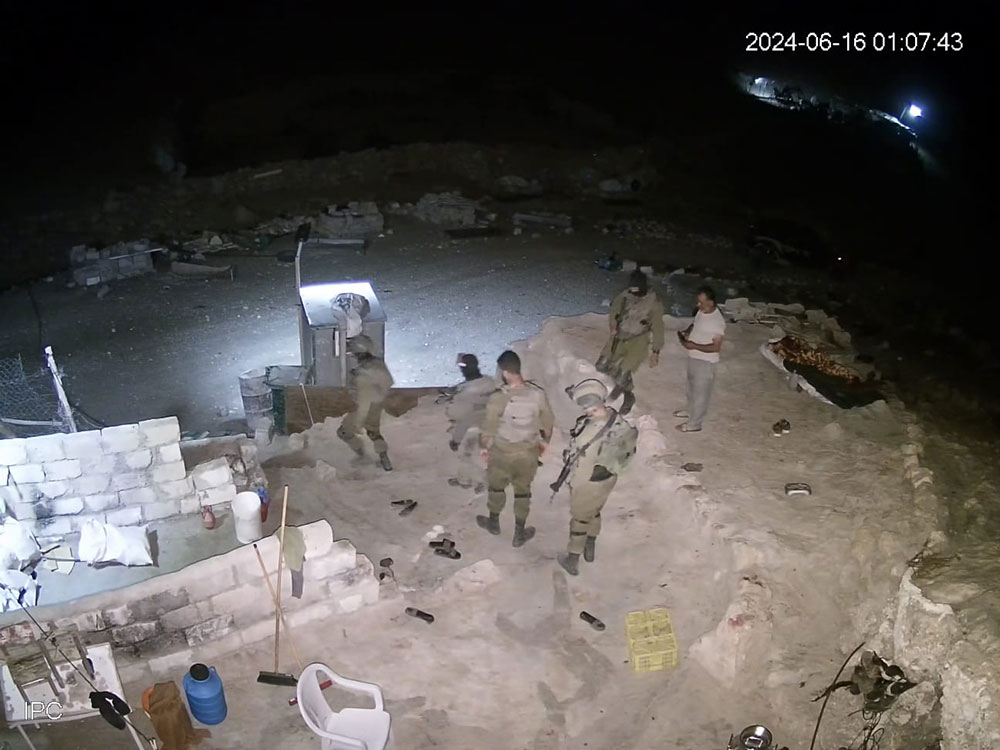 Occupation soldiers raid Shehadeh's family cave in Masafer Yatta.
Occupation soldiers raid Shehadeh's family cave in Masafer Yatta.
He continues, "But the targeting of the area by the occupation didn't start with the court's decision. It began with the occupation of the West Bank in 1967. Israeli planning there started with the so-called Allon Plan, aimed at displacing Palestinians from this area."
He points out that "the first attack by the occupation in the villages of Masafer Yatta began in 1966, during the Battle of Samu'. The homes in the area were destroyed, and demolitions continued until 1985 when all the houses in Masafer Yatta were razed to the ground."
Younis estimates that over 500 simple structures (such as 40 square meter homes, sheep pens, solar cells, schools, or clinics) have been threatened with demolition over the past years.
About 120 of these structures have been demolished so far, while others remain at risk of being demolished at any moment. Israeli courts have rejected any appeals or precautionary orders to prevent the demolitions, according to Younis.
Over 500 simple structures (such as 40 square meter homes, sheep pens, solar cells, schools, or clinics) have been threatened with demolition over the past years. About 120 of these structures have been demolished so far, while others remain at risk of being demolished at any moment. Israeli courts have rejected any appeals or precautionary orders to prevent the demolitions
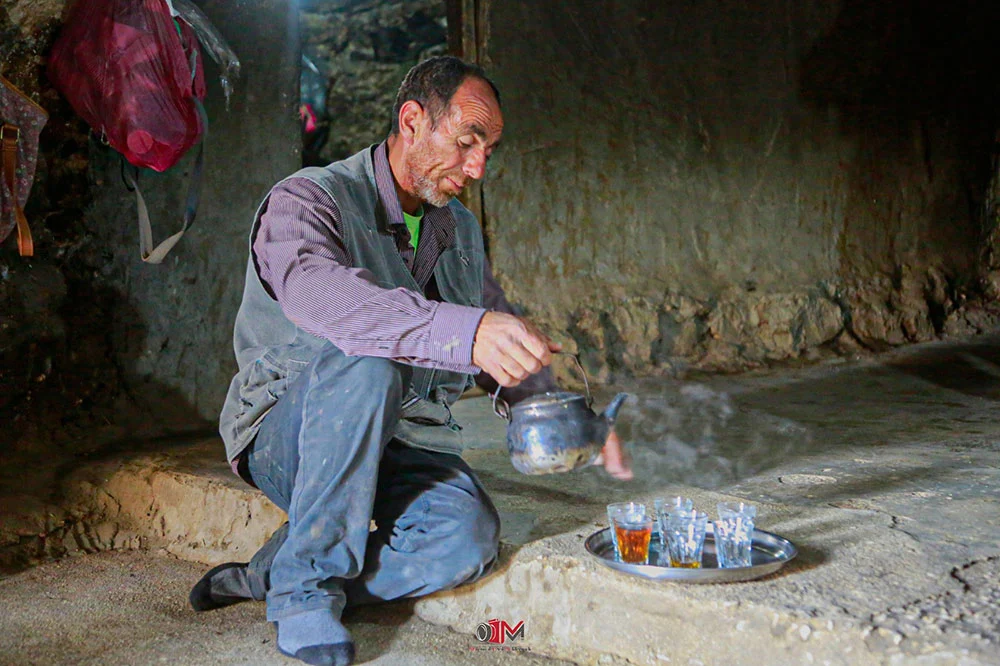 A resident of a cave in the Masafer Yatta pours tea.
A resident of a cave in the Masafer Yatta pours tea.
Adapting to the 21st century
The forced displacement policies have driven residents to adapt by refurbishing ninety caves to house ninety families, in addition to around forty caves that had been rehabilitated earlier.
The floors and walls were paved with cement, and internal partitions were added to maintain family privacy. Holes were sealed to prevent falling stones or the entry of insects and reptiles.
Simple dome-like structures were placed over the openings in the cave roofs to prevent water seepage, ensure ventilation, and allow smoke to escape.
This is how Palestinians made their caves somewhat suitable for modern living. However, access to electricity and water remains challenging.
Nuzha starts her day with breakfast and tea, then prepares taboon bread over a wood fire before she cooks food on it.
Meanwhile, her daughters feed the sheep, which her sons later take out to herd.
As for Issa Abu Aram's family, it now uses gas for cooking. "We get electricity through solar panels. We used to fetch drinking water from wells and store it in large containers. Now, it reaches us through a pipeline from the nearby village of At-Tuwani."
However, Mahmoud Abu Aram points out that the electricity generated by the solar panels is weak and does not meet their needs.
Similarly, Shehadeh Makhamreh's family from Khirbet Maghayir Al 'Abeed suffers from power outages, despite paying for electricity on a monthly basis.
"Our situation became more difficult after the occupation forces seized our legal vehicles. We are forced to pay around 200 shekels (about $50) every few days to bring sheep feed and family food."
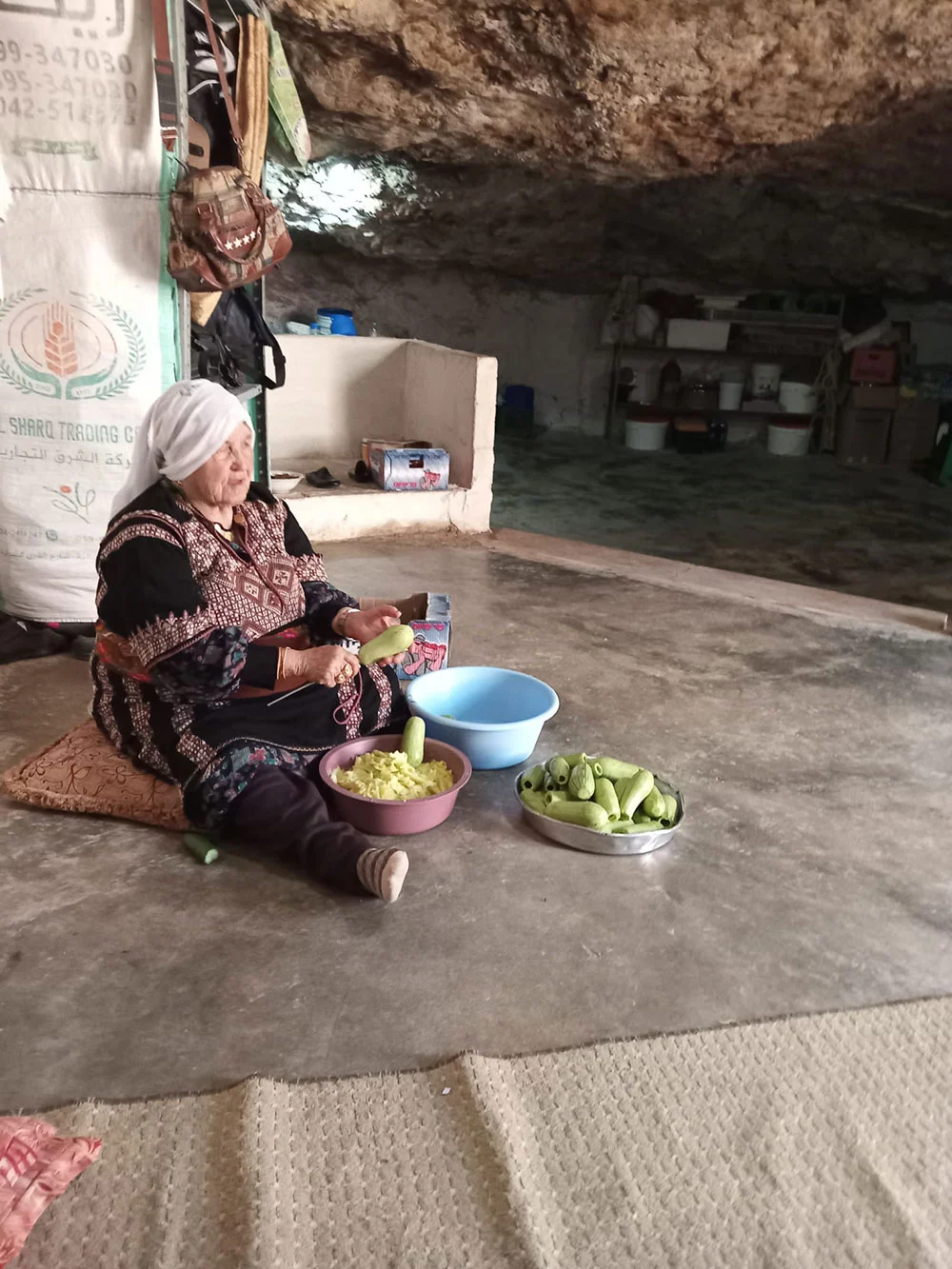 A Palestinian woman prepares koussa mahshi in Issa's family cave in Masafer Yatta.
A Palestinian woman prepares koussa mahshi in Issa's family cave in Masafer Yatta.
Who supports these cave dwellers?
"Most families rely on diesel or solar panels from civil society organizations to run generators. However, many of these were confiscated by the occupation," Younis confirms, before adding, "Water access has also become more difficult due to attacks by occupation forces and settlers on many water collection wells."
Despite this, Younis notes that residents have managed to access, store, and use water during periods where the supply was interrupted.
"People have nothing to face their harsh reality with, but patience and resilience," Younes says.
In response to this situation, some entities, such as European donors, the Palestinian Authority, or the Wall and Settlement Resistance Commission, have initiated some service projects, such as rehabilitating roads or providing infrastructure equipment.
"However, all these projects are very modest compared to what the area needs to lead a normal life," Younis comments.
Mahmoud Abu Aram agrees, saying, "We are not asking for the impossible. Just support us. At the very least, support us with sheep feed."
He concludes bitterly, "We would rather die than leave our land. From this place, there is no leaving."
Raseef22 is a not for profit entity. Our focus is on quality journalism. Every contribution to the NasRaseef membership goes directly towards journalism production. We stand independent, not accepting corporate sponsorships, sponsored content or political funding.
Support our mission to keep Raseef22 available to all readers by clicking here!
Interested in writing with us? Check our pitch process here!
